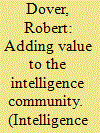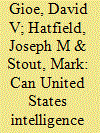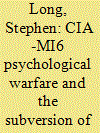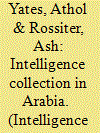|
|
|
Sort Order |
|
|
|
Items / Page
|
|
|
|
|
|
|
| Srl | Item |
| 1 |
ID:
174212


|
|
|
|
|
| Summary/Abstract |
Reviews of intelligence failures have recommended greater use of external expertise in challenging intelligence community assessments. External contributions were expected to augment covert collection and to provide open-source challenge to analysts, rather than to directly contribute to decision support. The structural limitations of the scope and machinery of intelligence have limited the value agencies can extract from external experts. Creating an Open-Source Intelligence Agency of commensurate size to primary intelligence organisations would enable decision support to be provided to all government departments. It would widen the pool of sources and experts, providing for greater extraction of value from experts who are only partially included in this government activity.
|
|
|
|
|
|
|
|
|
|
|
|
|
|
|
|
| 2 |
ID:
174211


|
|
|
|
|
| Summary/Abstract |
This article examines the origins of the Chinese seductress-spy to further existing literature on women and war, female archetypes and espionage in China. The diffusion of knowledge about women such as Mata Hari from the West to Republican China (1911–1949) developed a new female archetype that was neither Chinese nor Western, but both Chinese and Western. Instead of seeing Chinese seductress-spies as equivalent to their Western counterparts, we should see them as a uniquely gendered nationalist construct that had roots in the Japanese, English, as well as Chinese understanding of the role of women during wartime situations.
|
|
|
|
|
|
|
|
|
|
|
|
|
|
|
|
| 3 |
ID:
174214


|
|
|
|
|
| Summary/Abstract |
This article argues that United States Intelligence Community analysts can and should periodically telework as routine professional development and as a research supplement to traditional all-source intelligence analysis. We offer four key benefits to tapping into this reservoir of unclassified information that would improve the quality of the intelligence product, enable better liaison and academic exchange, and steward the profession. We conclude that an overdue rebalancing of classified and publicly available sources could be aided by telework, but only once analysts break free from ‘the cult of the SCIF’ will publicly available information receive the analytical attention that it deserves.
|
|
|
|
|
|
|
|
|
|
|
|
|
|
|
|
| 4 |
ID:
174208


|
|
|
|
|
| Summary/Abstract |
The west’s prototype covert action of the Cold War against Albania, codenamed BGFIEND/Valuable, is often characterized as a failure of the rollback policy against the Soviet bloc. This article argues that, from late 1949, the CIA and MI6 did not attempt to overthrow Enver Hoxha’s communist regime as historians have assumed, but to subvert and harass it primarily through psychological – not paramilitary – warfare. On one hand, western intelligence enjoyed some modest propaganda achievements, and valuable organizational and tradecraft experience was acquired for future operations. Nevertheless, BGFIEND/Valuable also faced innumerable challenges and setbacks, illustrating the difficulty of waging subversive psychological warfare against a hostile authoritarian state in the early Cold War.
|
|
|
|
|
|
|
|
|
|
|
|
|
|
|
|
| 5 |
ID:
174207


|
|
|
|
|
| Summary/Abstract |
Imperial powers, facing considerable information challenges in far-flung territories, adapted intelligence practices and machinery to fit local conditions. In contrast to the attention placed on British intelligence activities in territories considered within the ‘formal empire’ (i.e. where Britain was in direct control), we know very little about intelligence arrangements in ‘informal empire,’ where external powers exerted influence and protected their interests by working through local elites. Exploiting declassified documents and drawing upon interviews with retired intelligence officials, this article reveals Britain’s unique intelligence system in a remote corner of empire – the Trucial States (today’s United Arab Emirates) – which was built around a group of roaming officers tasked with collecting full-spectrum intelligence.
|
|
|
|
|
|
|
|
|
|
|
|
|
|
|
|
| 6 |
ID:
174210


|
|
|
|
|
| Summary/Abstract |
The U.S. Congress established the foundation of today’s surveillance state nearly a half century ago as it sought to regulate and prevent criminal activity: the Banking Secrecy Act to target tax evasion by individuals and the Foreign Intelligence Surveillance Act to create oversight of wiretapping activities by law enforcement. Over time, additional functions were layered onto the existing institutional infrastructure, such as combating illicit drugs. September 11th, 2001 served as a critical juncture, reorienting the regime yet again to support the counter terror mission, despite persistent inefficiency and simultaneous risks to the civil liberties of Americans.
|
|
|
|
|
|
|
|
|
|
|
|
|
|
|
|
| 7 |
ID:
174209


|
|
|
|
|
| Summary/Abstract |
Statutory oversight mechanisms for South Sudan’s intelligence service are weak and ineffective. The weakness of these mechanisms is directly related to the sense of security that the regime experiences. Internal threats facing the regime after South Sudan’s independence have resulted in an increase in the autonomy and influence of the National Security Service to counter opposition. Democratic principles, such as independent legislative oversight and respect for human rights have become subordinate to the political survival of the regime and its leaders.
|
|
|
|
|
|
|
|
|
|
|
|
|
|
|
|
| 8 |
ID:
174213


|
|
|
|
|
| Summary/Abstract |
This article examines alleged Czechoslovak assistance to the Italian extreme-left terrorist organisation, the Red Brigades, and how the case has been investigated in Czechoslovakia and the Czech Republic. The authors present the sources of information on the issue and analyse the course of the investigation undertaken by the Office for the Documentation and Investigation of the Crimes of Communism. In the absence of a complete archival record, given that important documents were shredded, the full truth about the fact and nature of any Czechoslovak assistance may never be known. Yet there are some grounds for speculation that assistance was granted by elements within the Czechoslovak secret services, and that these elements failed to inform the Communist Party leadership about their actions. However, it is not possible to confirm this on the basis of available documents.
|
|
|
|
|
|
|
|
|
|
|
|
|
|
|
|
|
|
|
|
|